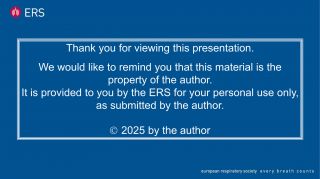6 February, 2025 | Online
11:00-12:00 CET
Chair: Dr Anna Spathis (Cambridge, United Kingdom)
Speakers: Dr Magnus Ekström (Lund, Sweden), Prof. Anne Holland (Fitzroy North (VIC), Australia), Prof. Natasha Smallwood (Melbourne (VIC), Australia), Dr Charles Reilly (London, United Kingdom)
Fees: Free for ERS members / €10 for non-members
Find out more about becoming a member
Overview
Respiratory symptoms are ubiquitous and impair health-related quality of life in people with respiratory disease. Even with best-practice and disease-directed management, symptoms such as breathlessness, cough and fatigue may persist. Patients describe an urgent need for strategies to better manage the symptoms that impact on their daily lives.
The ERS guideline on symptom management for adults with serious respiratory illness is the first ERS guideline to address this important topic. This webinar will present the latest evidence for pharmacological and non-pharmacological management of important symptoms including breathlessness, cough and fatigue, and will highlight evidence-based recommendations for symptom management.
Educational aims
- To discuss the ERS clinical practice guideline on symptom management for adults with serious respiratory illness
- To highlight recommendations for management of breathlessness, fatigue and cough in adults with serious respiratory illness
- To provide practical guidance for health professionals on managing symptoms in adults with serious respiratory illness.
This webinar will provide participants with a range of symptom management techniques that can be readily applied in clinical practice.
Topics:
- Rationale for the ERS clinical practice guideline on symptom management for adults with serious respiratory illness.
- Evidence underpinning recommendations related to treatment strategies of multicomponent services, breathing exercises, increased airflow, graded exercise therapy, opioids and oxygen therapy.
- Practical implementation of the guidelines to improve patient outcomes.
- Evidence gaps and future directions for symptom management in serious respiratory illness.
Format
- One-hour webinar format: 45 minutes for presentations and activities, followed by a 15-minute Q&A session.
Learning outcomes
Following this webinar, participants will be able to:
- Identify patients with serious respiratory illness who would benefit from symptom management approaches.
- Apply ERS guideline recommendations for symptom management in patients with serious respiratory illness.
- Evaluate and select suitable treatment options, balancing efficacy and potential side effects.
- Integrate guideline principles into practice to enhance patient care.
CME credit
An application for accreditation of this webinar has been made to the European Board for Accreditation in Pneumology (EBAP) for 1 CME credit per 1-hour attendance. If accredited, the CME credit will be granted upon attendance of at least 60 minutes during the live webinar only.
What is a webinar?
A webinar closely simulates a lecture-based teaching experience. The speaker can interact with the audience, just as in a classroom setting. During the webinar, you will be asked to share your opinion on issues related to the topic using interactive polls.
All participants will be able to hear the lecturer and see the slides throughout the presentation. As a participant you will be able to pose questions or discuss ideas with the other participants via the text chat facility and the speaker will respond to the questions via the microphone.
Diseases/methods:
- Airway diseases
- Interstitial lung diseases
- Pulmonary vascular diseases
- Thoracic oncology
- Infectious diseases
Target audience
- Pulmonologists
- General practitioners
- Nurses
- Respiratory therapists
- Respiratory physiotherapists
- Occupational therapists
- Pulmonary rehabilitation practitioners
- Palliative care practitioners

